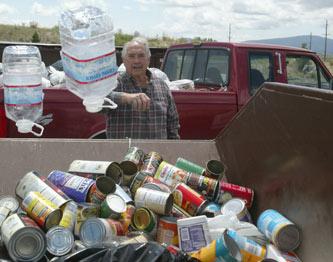Oregon’s green landscape turned a little gray in January with an announcement that the statewide rate of recycling rigid plastics slipped below 25%.
Oregon’s green landscape turned a little gray in January with an announcement that the statewide rate of recycling rigid plastics slipped below 25%. According to Oregon law, the dip means that businesses will be mandated in 2008 to use greener packaging, such as plastics with recycled content.
The consequences could be widespread, affecting nearly everyone who sells products in plastic containers in Oregon, from cottage cheese to paint, shampoo to water.
“Almost every retailer of every kind, grocery stores through hardware stores, is affected,” says Paul Cosgrove, an Oregon attorney who serves as government relations counsel for the Soap and Detergent Association. “It’s a lot of businesses.”
Officials at the state’s Department of Environmental Quality say the recycling rate for rigid plastics was 24.3% in 2005 — the most recent year for data. Three factors are blamed: poor sorting of materials in curbside recycling programs, higher sales of plastic beverage containers and an increase in non-bottle plastic containers, such as clamshell containers used to get leftovers home from the restaurant.
Because the state’s collective rate has dropped, individual businesses will be required to green up their packaging if they sell products in plastic containers. Under the rules, those containers must meet one of three criteria: contain 25% recycled content, be made of a type of plastic that is recycled in Oregon at 25%, or be reusable.
Back in October, the DEQ gave businesses a heads up with a standing-room-only meeting that outlined the problem. Attendees came from local and national businesses including Nike, Miller Paint Co., and the American Chemistry Council.
But makers of yogurt and 409 are in no hurry to change their packaging. During the one-year grace period, business leaders are pressing for a change in the law that would increase the recycling rate before they’d have to change their packaging. “There are 1,700 tons of plastics that go to the curbside and don’t get sorted appropriately and then end up as industrial waste,” says Julie Brandis, lobbyist for Associated Oregon Industries. “If we address that, if we find a better way to sort more effectively, does that resolve the problem?”
Some officials suggest that adding water and juice bottles to Oregon’s 35-year-old bottle bill would likely push the plastic recycling rate over 25%. But several industries adamantly oppose expanding the bottle bill — including grocers, who hate collecting smelly bottles at their stores, and distributors, who currently control the system of collecting and reselling glass, cans and soda bottles.
Lorena Young, a senior account manager for Weyerhaeuser, says recycling plastic is not just an environmental issue — it represents a business opportunity. “There are markets [for recycled plastic,]” Young says.
Plus, she says, Oregon is filled with businesses looking to be greener. “There are a lot of people very concerned with sustainability. They’re looking for opportunities to do the right thing.”
— Melissa L. Jones
Have an opinion? E-mail [email protected]



